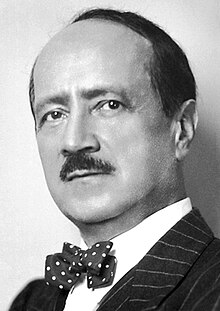Alexis Leger
| Alexis Leger | |
|---|---|
 |
|
| Born | Alexis Leger 31 May 1887 Pointe-à-Pitre, Guadeloupe |
| Died | 20 September 1975 (aged 88) Presqu'île de Giens, Provence, France |
| Pen name | Saint-John Perse |
| Occupation | Poet, diplomat |
| Alma mater | University of Bordeaux |
| Notable awards |
Nobel Prize in Literature 1960 |
Saint-John Perse (French: [pɛʁs]; also Saint-Leger Leger,pronounced [ləʒe]; pseudonyms of Alexis Leger) (31 May 1887 – 20 September 1975) was a French poet-diplomat, awarded the Nobel Prize for Literature in 1960 "for the soaring flight and evocative imagery of his poetry." He was a major French diplomat from 1914 to 1940, after which he lived primarily in the United States until 1967.
Alexis Leger was born in Pointe-à-Pitre, Guadeloupe. His great-grandfather, a solicitor, had settled in Guadeloupe in 1815. His grandfather and father were also solicitors; his father was also a member of the City Council. The Leger family owned two plantations, one of coffee (La Joséphine) and the other of sugar (Bois-Debout).
In 1897, Hégésippe Légitimus, the first native Guadeloupan elected president of the Guadeloupe General Council, took office with a vindictive agenda towards colonists. The Leger family returned to metropolitan France in 1899 and settled in Pau. The young Alexis felt like an expatriate, and spent much of his time hiking, fencing, riding horses, and sailing in the Atlantic. He was awarded the baccalaureate with honors, and began studying law at the University of Bordeaux. When his father died in 1907, the resulting strain on his family's finances led Leger to temporarily interrupt his studies, but he eventually completed his degree in 1910.
In 1904 he met the poet Francis Jammes at Orthez, who became a dear friend. He frequented cultural clubs, and met Paul Claudel, Odilon Redon, Valery Larbaud, and André Gide. He wrote short poems inspired by the story of Robinson Crusoe (Images à Crusoe) and undertook a translation of Pindar. He published his first book of poetry, Éloges, in 1911.
...
Wikipedia
